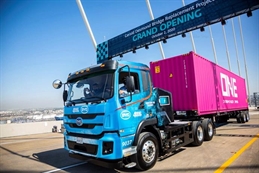
Port of Long Beach announced that the California government has granted the port US$2.5 million to fund the second phase of its Electric Vehicle Blueprint as part of its efforts to further decarbonise operations at the major North American gateway.
In its announcement, the port noted that the US$2.5 million award aids the second phase of the Port Community Electric Vehicle Blueprint, which the Port created to identify a holistic and strategic approach to electric vehicle planning and implementation, and identify opportunities to ensure the local workforce has the skills and abilities required to support and maintain an electric vehicle-ready community.
“A multimillion-dollar California Energy Commission Grant will help the Port of Long Beach transition to zero-emissions operations by developing infrastructure plans to support electric vehicles at the nation’s second busiest seaport,” Port of Long Beach said.
It added that projects covered by the grant include developing a master plan for SSA Marine's Pier J facility to convert to zero-emissions operations.
A similar master plan will be developed to evaluate the infrastructure required to support a fully zero-emissions port-owned fleet of vehicles and vessels.
Other projects include installing chargers at the Port’s Maintenance Facility as well as the infrastructure needed to power future chargers at the Port’s Joint Command and Control Center.
Zero-emissions by 2030
“The Port of Long Beach has forged a new direction for the shipping industry and today, we are on the path to zero-emissions operations by 2030 for cargo-handling equipment and 2035 for trucks servicing the Port,” said Mario Cordero, Port of Long Beach executive director. “I’m confident we will reach that goal, in no small part thanks to partners such as the California Energy Commission.”
Steven Neal, Long Beach Harbor Commission president said the partnership with the California Energy Commission has allowed the port to reduce diesel pollution by 90% compared to 2005.
“The Electric Vehicle Blueprint identifies the path toward zero emissions and will provide an economical, demonstrated approach to EV planning that other California seaports can replicate,” Neal added.
The Port of Long Beach said it will contribute US$847,072 matching funds toward the total US$3.4 million costs of the project.



